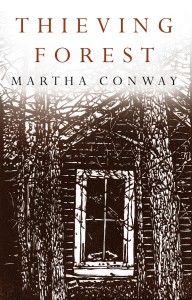How to Break Up with your Novel
 To begin with, let me clarify: I don’t mean abandon your novel; I mean separate yourself from it. This has to happen eventually. For better or worse the novel you’ve written will come to term, and it will have to live (or not live) on its own, away from you.
To begin with, let me clarify: I don’t mean abandon your novel; I mean separate yourself from it. This has to happen eventually. For better or worse the novel you’ve written will come to term, and it will have to live (or not live) on its own, away from you.
There may be any number of reasons why you want to break up. You might feel the novel is finished. You might want to start another project. Or perhaps you simply have a publisher’s deadline that is —guess what?!—today.
I had such an enormously hard time breaking up with my novel, Thieving Forest, that I made changes up to the last very last minute, when it was already formatted for print and ebook. I lived and breathed this novel for so long that I’d begun to feel as though I could spend the rest of my life filling in details that are better filled in by the reader’s imagination as she turns the pages.
Of course, I wanted to produce the best book I possibly could. But I don’t think changing “We’ll talk tomorrow” to “We’ll talk more tomorrow” at the last minute made one whit of difference in its quality. It was all about me habitually doing what I’d been doing for the past six years. Writing, re-writing, editing, re-writing. I had to break the habit.

Martha Conway, Thieving Forest
Like personal relationships, knowing when to break up is tricky business. Thinking back, I can see some signs that I was ready months before I finally broke up:
- I was going through the manuscript changing one word here and one word there, but nothing substantial.
- I fought the feeling that I should start all over and emphasize a different aspect of the story I wanted to tell. (In other words, write another novel altogether.)
- I spent a lot of time doing research about publishing. My actual writing time began to take up a minimal portion of my daily desk time.
- There was another story calling me, one I wanted to write.
Here’s where I ran into trouble: one of the ways I’ve learned to incorporate writing into my daily life is to make it a habit. I was used to sitting down every morning at eight o’clock with my cup of coffee and opening the same Word document that I opened the morning before. I put in my two hours, and closed the document. As a habitual person, this practice worked well for me. But starting a new document? That was a different beast altogether.
Plus, writing new material is hard! It may (it probably will) be terrible at first. I was used to knowing what my story was about, more or less. But when I begin a new project, I feel like I’m using a different part of my brain —more creative and open-ended and anything goes; less cerebral and definitely less in my control. That is the fun, exhilarating, and terrifying aspect of creative projects.
Notwithstanding my crazy urge to change a word here or there in the ebook document, once I realized that the time had come I found a few ways to trick myself into breaking up.
- I would not let myself open the manuscript file for two weeks. Even to check how the first chapter flowed. Even to re-check the word count. Two weeks away from it—I could do that.
- I sent the novel to beta readers. Beta readers take a long time to read manuscripts. And during that time I don’t really want to change anything because I don’t want to have different versions floating around. I found that this lull was a great time to do research or do some free writes for my next book. And then, guess what? I slowly began to get invested in the new story.
- I paid someone to copyedit the book. That helped me feel as though I was in the next stage of the book’s life, the stage after writing that ushers in production and publication. Sure, in theory I could still make changes, but then I’d have to have it copyedited again. And I’m kind of a cheapskate.
- I made an arbitrary date and took myself and a friend out to lunch to celebrate the novel’s completion. I never thought things like that mattered (celebrations) until I found that they did. Even if you decide to file your novel away under “starter novel” and never pursue publication, I urge you to celebrate the end of a great learning experience and the completion of a difficult task.
I’m hoping the next time around isn’t so bad, but it probably will be. Breaking up, as the cliché goes, is hard. Very hard. But I believe you can do it with grace. And maybe next time around, I will.
—
 Martha Conway is the author of Sugarland: A Jazz Age Mystery [Noontime Books], available via Amazon . Conway’s first novel was nominated for an Edgar Award, and her second novel, Thieving Forest, won the 2014 North American Book Award for Best Historical Fiction.
Martha Conway is the author of Sugarland: A Jazz Age Mystery [Noontime Books], available via Amazon . Conway’s first novel was nominated for an Edgar Award, and her second novel, Thieving Forest, won the 2014 North American Book Award for Best Historical Fiction.
Her short fiction has been published in The Iowa Review, The Carolina Quarterly Review, The Quarterly, The Massachusetts Review, Folio, and other journals. She teaches creative writing for Stanford University’s Continuing Studies Program and UC Berkeley Extension, and is a recipient of a California Arts Council Fellowship for Creative Writing. Born in Cleveland, Ohio, she is one of seven sisters. She currently lives in San Francisco.
Find out more about her on her website: http://marthaconway.com/
Follow her on twitter @marthamconway
Category: Contemporary Women Writers, How To and Tips































I’m still working on my first novel (already part of a planned trilogy because I love these characters too much), but I’m finding myself making minor changes and looking more towards publication and other stories. Thanks for the tip about not making major changes while the book’s with beta readers! I know there’s a section I want to change, but probably shouldn’t.
Renee,
Maybe you can talk to your beta readers about some of the changes you have in mind after they’ve read it. They’ll be a great resource for you. Of course, you might get wildly different suggestions … but you are the ultimate judge. Good luck!
Martha, your experiences have encouraged me to get on and make the break! This is my first novel and even post-edit with a cover chosen I keep tinkering around the edges instead of declaring it finished. I know why I am doing this: once I say it’s done, I am going to have to send it out into the world to find out whether other people feel about my characters as I do! Scary.
Hi Susan,
You are so right, it is scary. I don’t feel like I’m a controlling person in general, but I get to be completely in control of my novel … until the time comes when suddenly I’m not. Good luck, and congratulations on writing your first novel! What a huge milestone.
-Martha
I completely failed to break up! In the end, I wrote a trilogy as I couldn’t pull myself out of the world I had created. Now, with book 4, it’s turning into a series…
But each time manuscript goes to somebody outside – the structural editor, a beta reader, the copy editor – it edges a little nearer the door. Then it packs its suitcase and leaves to be with the publisher. I weep and then turn to the new love, but that new love still inhabits the same country as the old one.
A series! That’s a great way to stay together. Wish I’d thought of that. 🙂 Have you kept the same characters? Any favorites you can’t part with?
I broke up with my novel a while back but I still miss it! Such a companion. How I loved having a long-term project to nourish and dive into every day! Now I have short ones (articles) and the beginnings of a new book about the writing process itself. Not as interesting as writing a story, but a goal I’ve set to grow my editing business. Thank you so much for your perspective–breaking up is hard and right now it seems that getting to know (and birth) a new book feels even harder.
Sally, thanks for your comments. And congratulations for breaking up with your novel. (I still miss mine, too!)